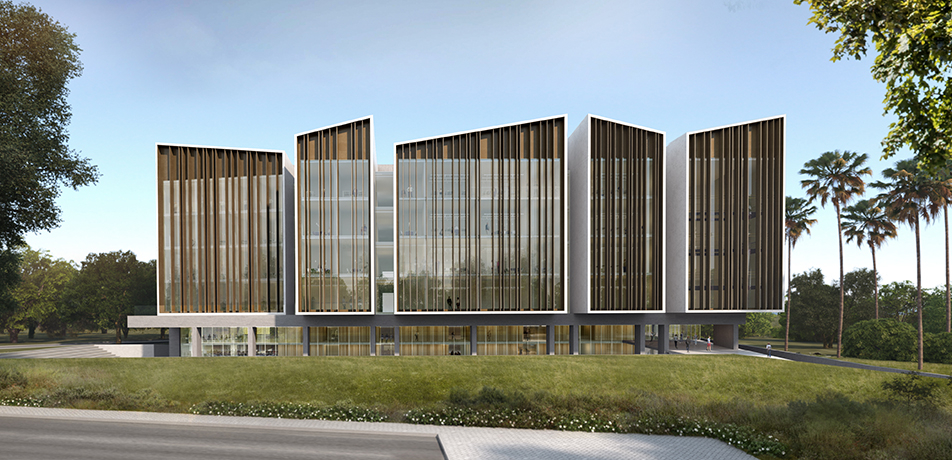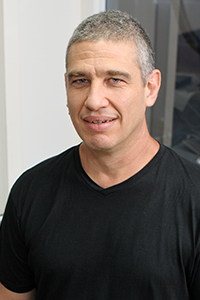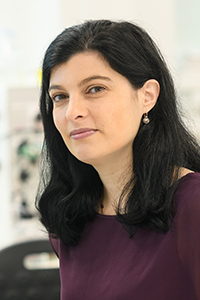The new nerve center for neuroscience
Collaborations will drive discovery in the Institute for Brain and Neural Sciences
Features

The neuroscience building rendering
To answer the most complex questions in the field of neuroscience is to wrap one’s hands around some of the biggest questions in biology, chemistry, physics, computer science, mathematics, and more—because so many fields have a winding or direct path to brain science.
How best to take on this enormous task can be found in multidisciplinary collaboration, which lies at the heart of the planned Institute for Brain and Neural Sciences.
This flagship project will include a state-of-the-art facility designed to encourage a fusion of expertise across a range of fields and areas of emphasis—both within the Department of Neurobiology and among the many Weizmann scientists outside the department whose non-neuroscientific expertise can provide the perfect complement for the task.
Here is a sampling of neurobiological quandaries Weizmann scientists are working to solve today. Imagine how much more we can do in the Institute for Brain and Neural Sciences.
How do we learn the rules of behavior and gain confidence that we know what we’re doing?
Prof. Rony Paz, a systems neuroscientist trained in mathematics, joins forces with Prof. Elad Schneidman, a computational neuroscientist with expertise in physics.
Can we see neurotransmitters flow between neurons?
Prof. Ofer Yizhar, a pioneer in the use of optogenetics to study neural circuitry, is working with Dr. Assaf Tal, a chemical physicist with expertise in magnetic resonance imaging at an atomic level.
What role does the brainstem play in regulating stress?
Neuroscientists Profs. Menahem Segal and Alon Chen are teaming up with Prof. Ayelet Erez, an expert in pediatric oncology and metabolic diseases.
Can we monitor metabolism as the brain develops?
Molecular geneticist Prof. Orly Reiner has teamed up with Prof. Noam Sobel and Dr. Rita Schmidt from Weizmann’s Azrieli National Institute for Human Brain Imaging and Research.
Can we visualize neurofeedback in action?
New scientist Dr. Michal Ramot is also working with the Azrieli National Institute to improve the use of real-time displays of brain activity to ‘rewire’ problematic neural circuits.
How can we encourage the brain to dissolve toxic amyloid tangles?
Structural biochemist Dr. Rina Rosenzweig is borrowing organic chemistry expertise from Dr. Nir London to address this neurodegeneration-causing scourge.
How does the brain regulate body weight?
Dr. Ivo Spiegel lent his expertise in the impact of experience on brain function to molecular geneticist Prof. Ari Elson in a study of how fat cell hormones communicate with the brain.
How can we harness the brain’s own immune cells–microglia—to combat neurodegeneration?
The lab groups of Prof. Tali Kimchi, Prof. Igor Ulitsky, and Prof. Ido Amit pooled their knowledge to characterize microglia structure and genetic activity across 10 species spanning more than 450 million years of evolution.
Can we reverse the cognitive deficits of Alzheimer’s disease?
Prof. Ido Amit and Prof. Emeritus Michal Schwartz identified a type of immune microglial cell capable of controlling neurodegeneration and countering cognitive impairment.
Are there genes we can target for personalized treatment of amyotrophic lateral sclerosis (ALS)?
Profs. Eran Hornstein and Doron Lancet are participating in an international consortium to identify gene variants that heighten the risk for ALS.
What are the mechanisms of neural circuit development?
Neurodevelopment and regeneration experts Profs. Oren Schuldiner and Avraham Yaron are tackling this complex question together.
How do dopamine-producing neurons in the retina function in health and in Parkinson’s disease?
Drs. Michal Rivlin and Meital Oren-Suissa are uniting their expertise to elucidate a better understanding of human vision as it relates to this debilitating disease.

Prof. Noam Sobel

Dr. Rina Rosenzweig